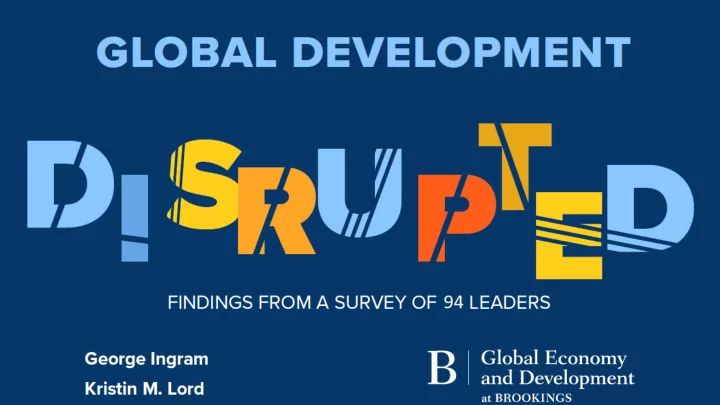

Methodology • Interviewed 94 leaders from NGOs, contractors, government agencies, foundations, corporations • Asked five open-ended questions: 1. What are the most important changes you see taking place in international development today? 2. How do you think international development will be different in 5-10 years? 3. What are your organization’s biggest challenges, internally and externally? 4. What are the new initiatives or new directions in your organization (or international development generally) that you are most excited about? 5. What are the most neglected challenges or opportunities you would identify in the global development sector? • Limitations of the study : Non-scientific sample. Perceptions only. Goal: Encourage reflection and debate for good decision-making
What did we find? • Fragmented development eco-system : actors, funding, issues, approaches • Long list of challenges compete for attention and resources • Poverty (14 mentions) no longer the defining lens • Rise of middle income countries raised 2.5 times more often (36 mentions) • Fragility (58 mentions) and migration (32 mentions) consuming resources and mindshare • Challenge of development in a “ two-tiered world ” • Rising influence of geopolitics/national interests on development • China ( 51 mentions) • Populism and nationalism (19 mentions) threaten support for development
Changing Development Landscape Diffusing Power • New actors (65 mentions) are transforming development: private sector (65), China (51), middle-income countries (36) • Catalytic role of business and private finance (investment + partnership) • “Localization” and greater ability of more countries to lead and pay for their own development • Closing Space (23 mentions) for civil society, international NGOs • Almost 10% of respondents volunteered that this is a major challenge
Most Mentioned Issues • Climate change (46 mentions) is most neglected issue • “Damocles sword” hanging over development and human progress • Also cited as exciting area for progress • Youth populations (41 mentions) seen as challenge and opportunity • Ripe with potential, innovation, and energy – if leveraged • Implementing organizations more focused on youth than funders • Empowerment women and girls/focus on gender (24 mentions) is source of optimism • SDGs (24 mentions) focus energy for some, not others
Selected Quotes “[I see an] end to development as a discrete profession as domestic and international issues become intermingled and the need grows for sector- specific, not broad international development, expertise” “Funding and solutions for fragile environments have not been prioritized or operated at a scale that can achieve outcomes.” “Climate change will swamp everything we do in the future but we lack the vision to see how it will impact our work across sectors.” “Where is the comprehensive plan to engage youth?”
How to pay for global development? • Revenue/funding (131 mentions) is the top concern for leaders across private and nonprofit organizations • Most mentioned issue overall • Fear and excitement about the future • New funding mechanisms and sources of revenue mean doing development differently • Worries that certain types of development could fall through the cracks • Broad dissatisfaction with short-term, project-based development funding “Funding is always the biggest challenge”
Innovation … and anxiety • Technology (95 mentions): top theme across organizations regardless of size • No consensus on the most important technologies • Fears of being left behind • New and/or spreading funding models • Development finance, earned income, impact investing, social entrepreneurship, domestic resource mobilization, shared value • Increased use of data (56 mentions) brings new rigor but under-used • Collaboration (54 mentions) but obstacles as well as benefits But … • Concerns about talent (39 mentions), business model (35 mentions), and relevance (18 mentions)
Recommend
More recommend